What are snap-on-dentures?
Snap-on-dentures is any denture that connects to a few dental implants for added security. There are a handful of names for this treatment including overdentures, implant-retained dentures, or hybrid dentures. Regardless of what you call them, snap-on-dentures offer a great solution for those who want to improve the fit of their dentures without spending a fortune. Treatment is easy and affordable. Plus, almost everyone qualifies for this treatment no matter how little jawbone you have. Snap-on-dentures are more stable than traditional dentures. The implants hold the dentures in place to make them more stable than full dentures. It's important to understand that snap-on-dentures are still dentures. This means that they are removable false teeth that come in and out of your mouth. These are not fixed, permanent teeth.
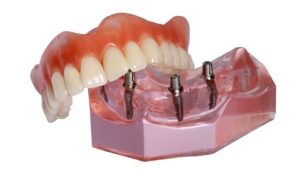
Snap-on-denture treatment is easy, affordable, and most patients qualify for treatment
What is the process for snap-on-dentures?
Snap-on-denture treatment begins by placing a few dental implants in your mouth. You have the option of receiving two, four, or even six dental implants to secure your dentures. Although rare, there is also the option to receive an implant-supported bar for maximum stability. There are many factors to consider when deciding on how many dental implants to receive, including:
- Bite forces - You should place more implants if you have denture teeth that oppose natural teeth on the opposing arch.
- Jaw size - The larger your jaw, the more implants you should consider placing.
- Bone quality - You need to have strong enough jaw bone to support multiple implants if that is your plan.
- Budget - There is a significant cost difference in treatment based on how many dental implants support the denture teeth.
Consult with your dentist to decide on how many implants are best to support your snap-on-dentures. Once the implants have healed, your dentist will make you a new set of dentures. The new denture will look similar to a regular one, but it will have anchors on the inside that lock onto the implants. When you insert snap-on-dentures into your mouth, the connectors engage the implants and lock them in place. This provides for a better fit, less movement, and an overall more enjoyable denture-wearing experience. You're still wearing dentures, but you're wearing the best dentures that money can buy!
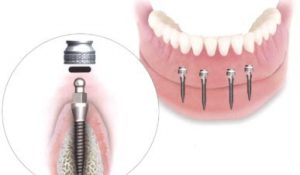
Snap-on-dentures look similar to regular dentures but with anchors that lock them to a few dental implants
How long does treatment take?
Snap-on-denture treatment is easy and quick if you go to an experienced dentist. Treatment typically takes just a few months, about 2 to 4 months on average. There are even a handful of dentists who offer same-day treatment for qualifying candidates. Regardless, treatment is fairly quick, easy, and relatively pain-free. In contrast, full mouth implants and all-on-four treatments take significantly longer to complete, cost way more, and are much more painful as well.
Here is a preview of the snap-on-denture process to give you a better understanding of what to expect. There are two steps involved in fabricating snap-on-dentures: (a) implant placement surgery and (b) denture fabrication and engagement. The implant surgery is relatively simple as it is far less invasive than most surgical dental procedures. Implant surgery is typically completed during one session. You will leave with several dental implants sticking out in your mouth. A few weeks or months later you will receive your dentures. The denture process is similar to other denture treatments. The only difference is that a few connectors are added to the denture at the very end. The connectors are added by either your dentist directly inside the mouth or by a lab technician using pick-up impressions of your denture teeth. Either way, the connectors are added to the denture to connect the implant and dentures together. The result is a more comfortable denture that moves less and is easier to chew with.
How long do snap-on-dentures last?
The dental implants that you receive should last a lifetime. The denture teeth are also quite durable and typically last for many many years, sometimes a lifetime. Most snap-on-dentures patients never feel the need to get a new denture unless they break or lose their teeth. Of course, there are some people who choose to replace their snap-on-dentures after so many years. Regardless of your choice, the implants will remain in your mouth indefinitely and you only need to redo the denture teeth if you choose to.
One more benefit of snap-on-dentures is that they require minimal maintenance. The denture teeth may loosen after several years. You can replace the connectors, known as O-rings, to make them tighter. The connectors are these little colorful, circular rubber-like materials that sit inside the denture connectors. Replacing old O-rings with new ones will immediately improve the fit of your snap-on-dentures. This is a simple and inexpensive treatment that usually costs about as much as a check and cleaning do. Talk to your dentist to see if it's time to replace your O-rings to improve the fit of your snap-on-dentures.
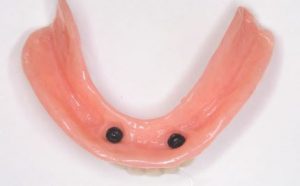
We recommend that you replace the snap-on-denture connectors, known as O-rings, every few years
How much does treatment cost?
Snap-on-dentures offer a relatively affordable way to improve the fit of loose dentures. While not cheap, snap-on-dernture treatment is only a fraction of the cost of permanent teeth replacement. Treatment costs vary based on how many dental implants you choose to place inside the mouth and where you seek treatment. Prices begin from as little as $4,000 to $5,000 per arch (upper or bottom) but can go as high as $10,000 or $15,000 as well.
- Two dental implants plus a denture - This is the most affordable snap-on-denture treatment option. You have to pay for two implants plus a new set of dentures. The cost is can be as low as $3,000-$4,00 up to $8,000-$10,000 for this treatment option
- Four dental implants plus a denture - Adding an extra pair of dental implants will significantly improve the fit of your dentures. However, it will also raise the cost of your treatment by $2,000 to $5,000 per additional implant, accounting for the cost of each implant and corresponding connector.
- Multiple implants plus a denture bar plus a denture - A denture bar is the most stable of all snap-on-denture treatment options. You need at least four implants, but possibly 5 or 6 implants to support a bar. The problem is that denture bars are very expensive. Expect to pay well over $10,000 if you're planning on adding a bar to support your snap-on-dentures.
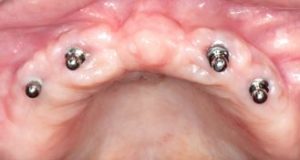
Snap-on-denture treatment cost depends on how many dental implants you choose to place inside your mouth
For those of you who are considering the denture bar option, it might not be a bad idea to consider permanent teeth as well. After all, the price difference between denture-bar and all-on-four teeth is not that much. It's typically worth spending a little bit more to get permanent teeth and not having to deal with dentures any longer.
Will I need a new denture or can I continue using my existing denture?
Most patients undergoing snap-on-denture treatment need a new set of dentures. However, if you recently received a new denture that you love, there is a small chance that your dentist can convert this denture into a snap-on-denture. First, your dentist must examine your denture to see if they are suitable for this conversion. If it's determined that a conversion is possible, your dentist will add connectors to the existing denture. The way this works is that your dentist will create a series of holes in your existing denture that corresponds to the implants. He or she will place the implants in a position that lines up with the existing denture. Then, once the implants are healed, your dentist will connect the two together. Your denture is now converted into a snap-on-denture and connects to your implants. Keep in mind, this conversion only works for a limited number of cases. Talk to your dentist to see if this is a viable treatment option for your mouth.

There is a small chance that your dentist can convert your existing dentures into snap-on-dentures
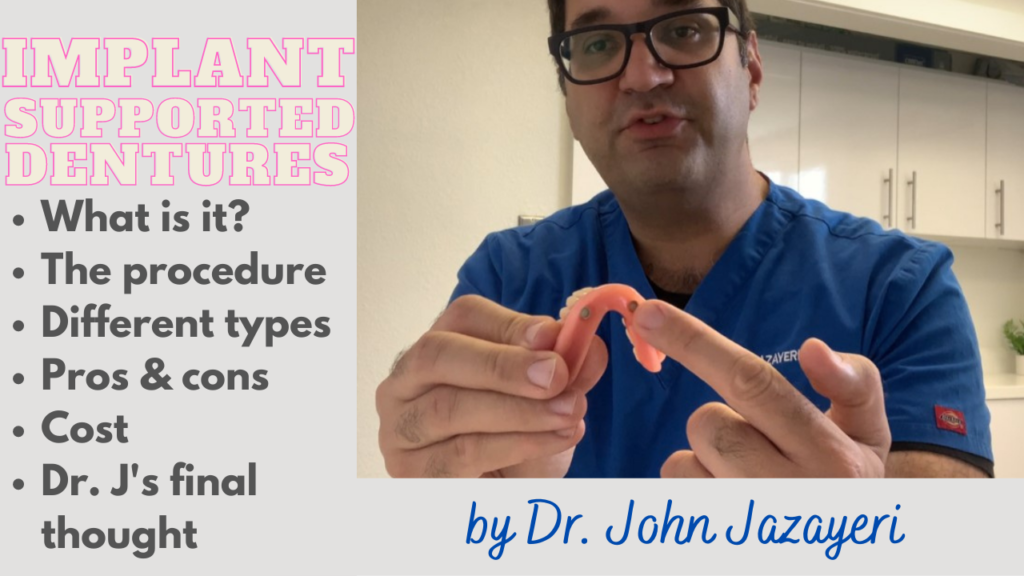
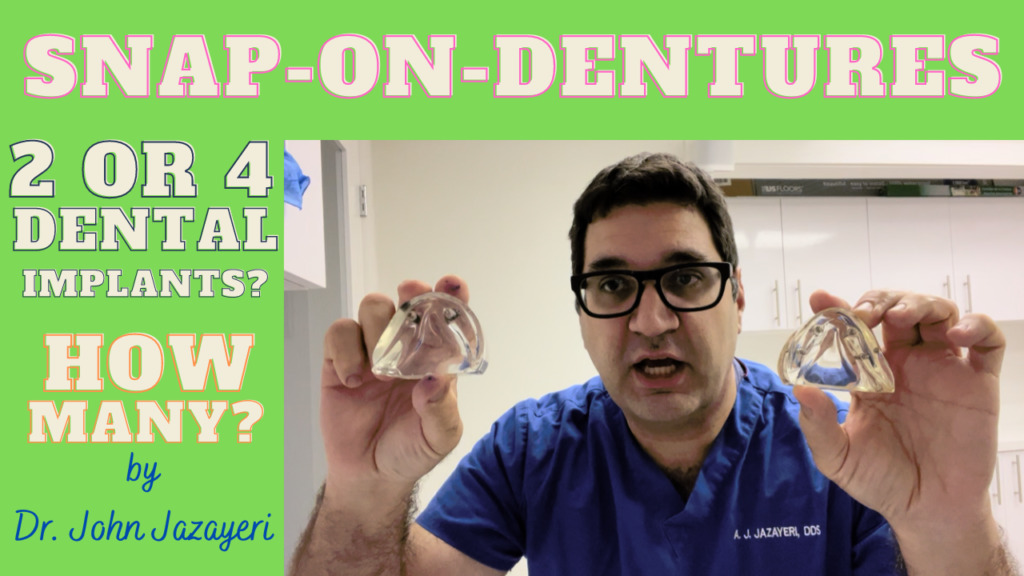
0 Comments